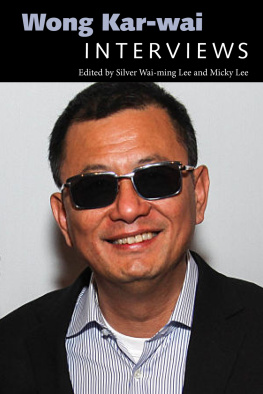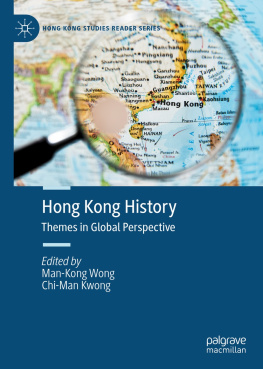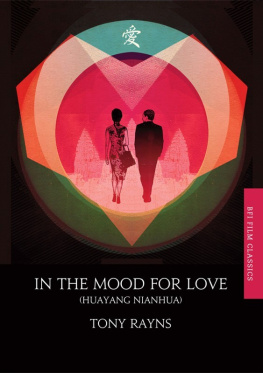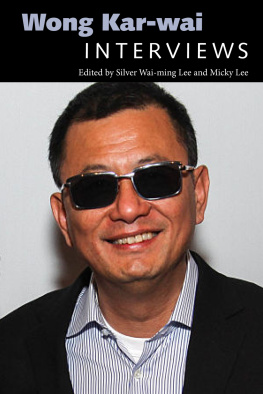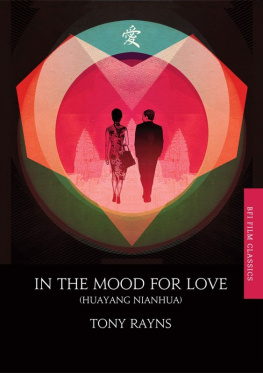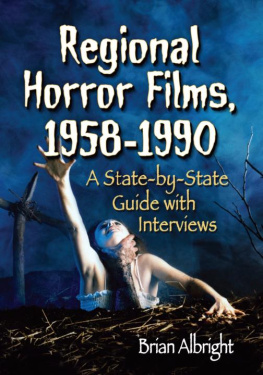
Wong Kar-wai: Interviews
Conversations with Filmmakers Series
Gerald Peary, General Editor
Wong Kar-wai
INTERVIEWS
Edited by Silver Wai-ming Lee and Micky Lee
University Press of Mississippi / Jackson
www.upress.state.ms.us
The University Press of Mississippi is a member of the Association of American University Presses.
Copyright 2017 by University Press of Mississippi
All rights reserved
Manufactured in the United States of America
First printing 2017
Library of Congress Cataloging-in-Publication Data
Names: Wong, Kar-wai, 1958author. | Lee, Silver Wai-ming editor. | Lee, Micky editor.
Title: Wong Kar-Wai : interviews / edited by Silver Wai-ming Lee and Micky Lee.
Description: Jackson : University Press of Mississippi, 2017. | Series: Conversations with filmmakers series | Includes bibliographical references, filmography and index. |
Identifiers: LCCN 2017010478 (print) | LCCN 2017027866 (ebook) | ISBN 9781496812858 (epub single) | ISBN 9781496812865 (epub institutional) | ISBN 9781496812872 ( pdf single) | ISBN 9781496812889 (pdf institutional) | ISBN 9781496812841 (cloth : alk. paper)
Subjects: LCSH: Wong, Kar-wai, 1958Interviews. | Motion picture producers and directorsChinaHong KongInterviews.
Classification: LCC PN1998.3.W65 (ebook) | LCC PN1998.3.W65 A5 2017 (print) | DDC 791.4302/33092dc23
LC record available at https://lccn.loc.gov/2017010478
British Library Cataloging-in-Publication Data available
Contents
Lok Ching /1988
Cheuk Chi /1988
Angel /1989
Jimmy Ngai /1990
Yeung Wai-lan and Lau Chi-kwan / 1994
Michel Ciment / 1994
Lin Yao-teh / 1994
Gary / 1995
Gary Mak / 1995
Yik Ming / 1997
Michel Ciment and Hubert Niogret / 1997
Michel Ciment and Hubert Niogret / 2000
Tony Lan Tsu-wei / 2000
Mark Salisbury / 2004
Tony Lan Tsu-wei / 2004
Hong Kong Film / 2007
Tony Rayns / 2008
Damon Houx / 2008
Li Hongyu / 2013
David Poland / 2013
Jake Mulligan / 2013
An Ying / 2015
Introduction
This volume collects twenty-two interviews of Wong Kar-wai conducted over nearly three decades. The contents and the order in which the interviews appear reflect a divide between what Wongs films mean to Hong Kong and international critics. The first four interviews are on Wongs first two films: As Tears Go By and Days of Being Wild. The fourth film Chungking Express that made Wongs name known to an international audience is mentioned in the fifth interview. The last four interviews are all on The Grandmasterthe two American critics see it as a kung fu film while the Chinese critics see it as a period film about the Republic of China.
The first interview in this volume Wong Kar-wai on As Tears Go By was published in 1988 in the now defunct Hong Kong magazine City Entertainment (in Chinese Film Biweekly). In the interview, Wong talks about his first directed feature film, As Tears Go By, which not only received praises among Hong Kong critics, but also performed fairly well in the domestic box office. But it was Wongs second film, Days of Being Wild, that made himfor better or for worsea household name in Hong Kong. The critics were pleased that Hong Kong cinema had a director who went against the commercial tide, but the mainstream press was keen on reporting on the lengthy production time and the extraordinary budget in gossip sections. More than two decades after the release of Days of Being Wild, Wongs films have been exhibited in the most prestigious film festivals and have received international accolades. However, Hong Kong mainstream media still complain about Wongs films being incomprehensible and taking too much time and money to make. For example, the critics still have not concluded whether Wongs latest film The Grandmaster is a frivolous showing off or a rich cinematic text.
Similarly, Wongs films receive polarized feedback from the audience. On one hand, Wong has a lot of devoted and enthusiastic fans who collect film memorabilia, discuss his films online, quote from his films, and create fan arts. On the other hand, Wongs films are rarely blockbusters, his latest The Grandmaster being an exception. Hong Kong locals use Wong Kar-wai in daily life as a derogatory term when describing something abstract and artistic.
Unlike the local audience who had already formed an opinion of Wong quite early on in his career, most of the international audience first learned of Wong Kar-wais work through his fourth feature film Chungking Express. International film festivals such as Cannes, Berlin, and Toronto offer critics and fans outside Asia a first glimpse at Wongs latest work. Film festivals generate buzz that excites Wongs fans around the world. They also prove his films are greatly admired among critics and judges. For example, Wong received the prestigious Best Director Award for Happy Together at Cannes, making him the first Chinese director to earn this award. In addition, Wongs films are frequent subjects of scholarly debate not only in the Chinese language, but also in English, French, Italian, German, and so on.
The text provided by critics on Wong Kar-wai is as rich as Wongs films. The collected interviews not only provide scholars, critics, and fans with materials for further criticism and interpretation, but they are texts themselves that reveal what Wong thinks and what critics think of Wong and his films. Framing the interviews as both resources and discourses about Wong, this introduction aims to do three things: first, situate Wong Kar-wai in the two new waves of Hong Kong cinema; second, summarize Wongs explanations of the development process of various films; and third, summarize how Wong sees his artistic influence and regular collaborators.
Over the span of more than two decades, Wong maintains a consistent auteur persona in the interviews. He is able to explain the creation process of every film and suggest how he worked with the cinematographers, art directors, editors, and actors. Unlike most Hong Kong directors who made films scripted by others and produced by major studios in the 1980s, his work is said to have a signature style reflected from story-telling, aesthetics, and acting. Wongs vision and artistic control of his films stems from his emerging from the Second Wave of new Hong Kong cinema.
When Hong Kong New Wave emerged in the late 1970s and early 1980s, it was more an accidental outcome than an intended movement. These directors include Ann Hui, Tsui Hark, Patrick Tam, Allen Fong Yuk-ping, Alex Cheung Kwok-ming, and Yim Ho. They neither made any joint declaration nor regularly cooperated with each other. Nonetheless, their background is very similar: most of them returned to Hong Kong after studying films in the UK and the US. Before making films, some of these directors worked for public television channel Radio Television Hong Kong; others worked for commercial television station TVB.
New Wave directors produced genre films with experimental elements. They produced refreshing and exciting TV dramas and genre films because they were aware that television shows and films could be art, political statements, as well as mass entertainment. These directors renewed and transformed conventional genres by introducing new techniques they learned from the West. For example, Tsui Hark introduced elements of Hollywood sci-fi and horror to the wuxia genre. New Wave directors believed filmmaking is not only about storytelling, but film scoring and art direction are also key components. They explored lesser-known social issues and the Hong Kong identity. With on-location shooting, the cityscape has become an important part of New Wave films. For example, Ann Huis
Next page
